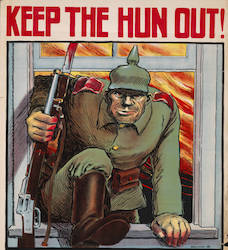
Anti-German Sentiment in the U.S. World Wars I and II had a severely negative impact on German Americans.
When the U.S. entered the war in 1917, some German Americans were looked upon with suspicion and attacked regarding their loyalty. Propaganda posters and newspaper commentary fed the growing fear. The American Red Cross barred individuals with German last names from joining in fear of sabotage.
The town, Berlin, Michigan, was renamed Marne, Michigan (in honor of those who fought in the Battle of the Marne). The town of Berlin, Ohio, changed its name to its original name of Fort Loramie, Ohio.
German street names in many cities were changed. German and Berlin streets in Cincinnati became English and Woodward. In Chicago, Lubeck, Frankfort, and Hamburg Streets were renamed Dickens, Charleston, and Shakespeare Streets.
In New Orleans, Berlin Street was renamed in honor of General Pershing, head of the American Expeditionary Force. In Indianapolis, Bismarck Avenue and Germania Street were renamed Pershing Avenue and Belleview Street, respectively in 1917, Brooklyn‘s Hamburg Avenue was renamed Wilson Avenue.
Many businesses changed their names. In New York City, the giant Germania Life Insurance Company became Guardian Life Insurance. Likewise, the German Dispensary and the German Hospital in New York were renamed Lenox Hill Hospital and Wyckoff Heights Hospital respectively.
Many schools stopped teaching German language classes. The City College of New York continued to teach German language courses, but reduced the number of credits that students could receive for them.
Books published in German language were removed from libraries or even burned. In Cincinnati, the public library was asked to withdraw all German language books from its shelves. In Iowa, in the 1918 Babel Proclamation, Governor William L. Harding prohibited the use of all foreign languages in schools and public places. Nebraska banned instruction in any language except English, but the U.S. Supreme Court ruled that the ban was illegal in 1923.
Some words of German origin were changed, at least temporarily. Sauerkraut came to be called “liberty cabbage,” German measles became “liberty measles,” hamburgers became “liberty sandwiches,” and dachshunds became “liberty pups.”
In parallel with these changes, many German Americans elected to anglicize their names (e.g., Schmidt to Smith, Müller to Miller). Many state governments also sought to coercively limit the use of the German language in the U.S. in public places and most especially inside churches.
United States in World War II
Between 1931 and 1940, 114,000 Germans and thousands of Austrians moved to the U.S., many of whom – including, e.g., Nobel prize winner Albert Einstein, Bertold Brecht, Henry Kissinger, and Thomas Mann – were either Jewish Germans or anti-Nazis who were fleeing Nazi oppression.
About 25,000 people became paying members of the pro-Nazi German American Bund during the years before the war. The Alien Registration Act of 1940 required 300,000 German-born resident aliens who had German citizenship to register with the Federal government and restricted their travel and property ownership rights.
Under the still active Alien Enemy Act of 1798, the U.S. government interned nearly 11,000 German citizens between 1940 and 1948. An unknown number of “voluntary internees” joined their spouses and parents in the camps and were not permitted to leave.
With the war ongoing in Europe but the U.S. neutral, a massive defense buildup took place, requiring many new hires. Private companies sometimes refused to hire any non-citizen, or American citizens of German or Italian ancestry. This threatened the morale of loyal Americans.
President Franklin Roosevelt considered this “stupid” and “unjust.” In June 1941, he issued Executive Order 8802 and set up the Fair Employment Practice Committee, which also protected Black Americans.
President Roosevelt sought out Americans of German ancestry for top war jobs, including General Dwight D. Eisenhower, Admiral Chester W. Nimitz, and General Carl Andrew Spaatz. He appointed Republican Wendell Willkie as a personal representative.
German Americans who had fluent German language skills were an important asset to wartime intelligence, and they served as translators and as spies for the U.S. The war evoked strong pro-American patriotic sentiments among German Americans, few of whom by then had contacts with distant relatives in the old country.
The October 1939 seizure by the German battleship Deutschland of the U.S. freighter S.S. City of Flint, as it had oil for Britain on board, provoked much anti-German sentiment in the U.S.
Following its entry into the War against Nazi Germany in December 1941, the U.S. Government interned many German and Italian citizens as ‘enemy aliens.’ The exact number of German and Italian internees is a subject of debate. In some cases their American-born family members volunteered to accompany them to internment camps to keep the family unit together. The last to be released remained in custody until 1948.